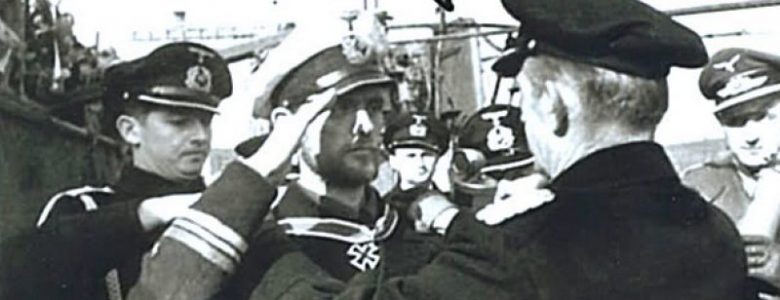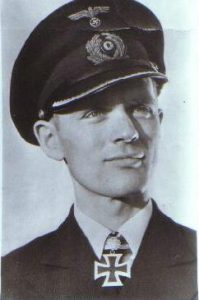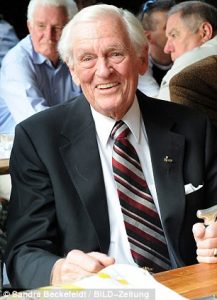Reinhard Hardegen Korvettenkapitän of the U-boat U 123 more then 100 years old..

Reinhard Hardegen born, 18-03-1913 in Bremen, began his naval career in April 1933. After two and a half years he was transferred, together with other officers, to the Marineflieger (Naval Air Force) branch of the Kriegsmarine .svg/266px-War_ensign_of_Germany_(1938-1945).svg.png)
 . Hardegen was trained as an aircraft observer and later as a pilot. Following a crash and an ensuing six months in hospital, he transferred to the U-boat force in November 1939. He received his first operational experience on U-124, under Kapitänt. Georg Wilhelm Schulz
. Hardegen was trained as an aircraft observer and later as a pilot. Following a crash and an ensuing six months in hospital, he transferred to the U-boat force in November 1939. He received his first operational experience on U-124, under Kapitänt. Georg Wilhelm Schulz 
 . Schulz as one of the few U-boat Kapitäns survived the war and he turned 100 in March 2013 in very good health, winning golf trophies and still driving a car.
. Schulz as one of the few U-boat Kapitäns survived the war and he turned 100 in March 2013 in very good health, winning golf trophies and still driving a car.
In December 1940 Hardegen was made commander of U-147. On his first patrol in her in March 1941 he sank the Norwegian steamer Augvald (4,811 tons).
On 16 May 1941 he took over U-123, a very successful boat, from Kapitän Karl Heinz Moehle 
 . Moehle died on 17 November 1996 at the age of 86 in Ahrenburg. On his first patrol, in summer 1941 in West African waters, Hardegern
. Moehle died on 17 November 1996 at the age of 86 in Ahrenburg. On his first patrol, in summer 1941 in West African waters, Hardegern  sank five ships with a total of 21,507 tons. In October 1941 he torpedoed the British auxiliary cruiser HMS Aurania (13,984 tons), but the badly damaged ship was towed to harbour by two destroyers.
sank five ships with a total of 21,507 tons. In October 1941 he torpedoed the British auxiliary cruiser HMS Aurania (13,984 tons), but the badly damaged ship was towed to harbour by two destroyers.
Hardegen’s medical history then finally caught up with him. Due to injuries received in the 1936 plane crash, Hardegen had actually been classed as unfit for U-boat service. However, his papers had repeatedly arrived at each training location after he had already departed for the next. Now Karl Dönitz learned of Hardegen’s lingering injuries (including a shortened leg and chronic bleeding of the stomach which required a special diet), but rewarded Hardegen’s dedication by permitting him to carry out two further patrols.
On 23 December 1941 U-123  left Lorient on a special mission. She was one of five U-boats ordered to launch an attack against the eastern coast of the United States, part of operation Paukenschlag (Drumbeat).
left Lorient on a special mission. She was one of five U-boats ordered to launch an attack against the eastern coast of the United States, part of operation Paukenschlag (Drumbeat).
On 12 January 1942, before reaching the operational area, Hardegen sank the British freighter Cyclops in Canadian waters. Although this was two days before the official start of Operation Paukenschlag, the commanders had permission to sink ships on the crossing to the US coast if they were larger than 10,000 tons. The next two weeks were very successful for U-123, sinking nine ships with a total of 53,173 tons. On 20 January Dönitz sent the following radiogram:
An den Paukenschläger Hardegen. Bravo! Gut gepaukt. Dönitz. (For the drum-beater Hardegen. Well done! Good beating. Dönitz. )
Three days later Hardegen received a radio message that he had been awarded the Knight Cross.
In March 1942 Hardegen was once more in U-123 off the US east coast. During this second Drumbeat patrol he sank ten ships with a total of 57,170 tons.  For this additional outstanding patrol he was awarded the Oak Leaves to his Knights Cross while still at sea.
For this additional outstanding patrol he was awarded the Oak Leaves to his Knights Cross while still at sea. _und_Kapit%C3%A4nleutnant_Reinhard_Hardegen_(Mitte)_bei_der_Eichenlaubverleihung_durch_Hitler,_F%C3%BChrerhauptquartier_Wolfsschanze.jpg/320px-Kapit%C3%A4nleutnant_Erich_Topp_(links)_und_Kapit%C3%A4nleutnant_Reinhard_Hardegen_(Mitte)_bei_der_Eichenlaubverleihung_durch_Hitler,_F%C3%BChrerhauptquartier_Wolfsschanze.jpg)
 In May 1942 Hardegen brought U-123 back to Kiel for repair.
In May 1942 Hardegen brought U-123 back to Kiel for repair.
On 31 July 1942 he left U-123 to become an instructor with the 27th Flotilla in Gotenhafen. In March 1943 Kapitän Hardegen became chief of U-boat training at the Torpedo School at Mürwik. After then serving in the Torpedowaffenamt (torpedo technical department) for a few months, he was made a battalion commander in Marine Infanterie Regiment 6 in February 1945.
After the war Reinhard Hardegen spent more than a year in British captivity before returning home in November 1946. He built up a successful oil trading company and was a representative in the diet (city parliament) in his hometown of Bremen for 32 years.
On 18-03-2016 he celebrated his 103rd birthday in Bremen in very good health, winning golf trophies and still driving a car..













Leave a Reply